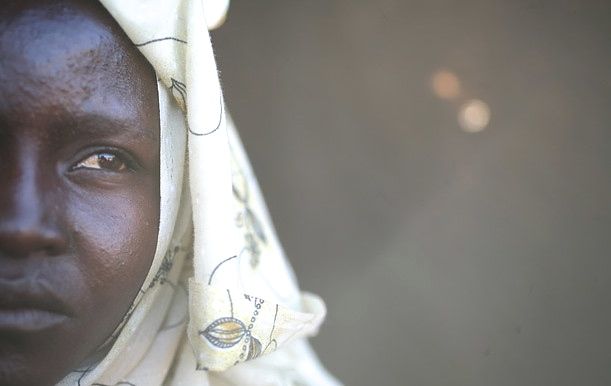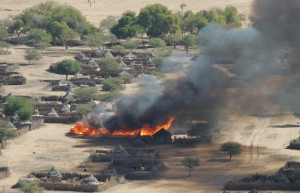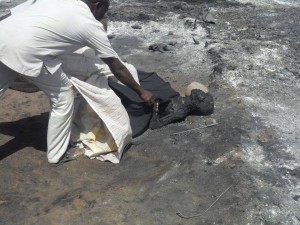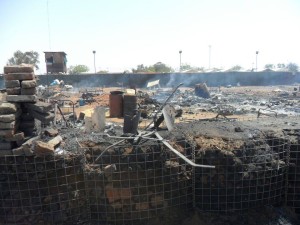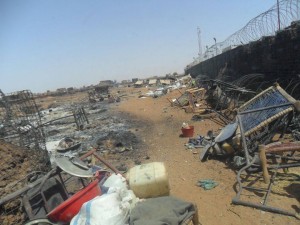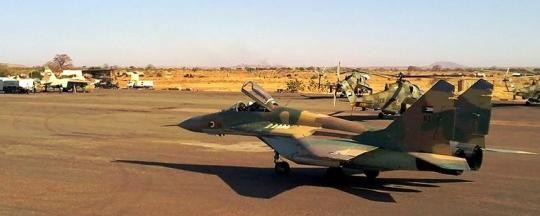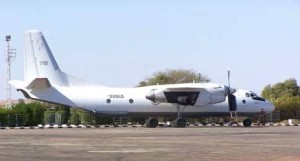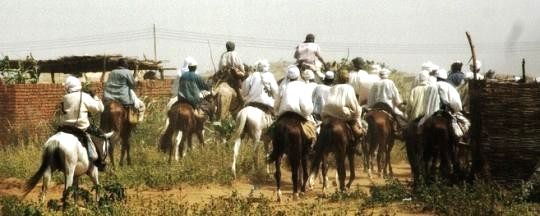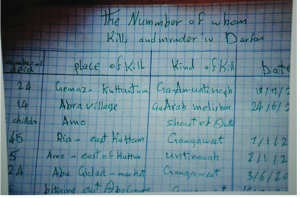For six years Radio Dabanga has been by far our most important and reliable source of information about what is occurring in Darfur. The UN Secretary-General’s quarterly reports on Darfur and UNAMID—depending as they do primarily on information from the incompetent and failing “hybrid” Mission—are largely worthless, and frequently contain scandalous omissions. There have been periods, for example, in which Ban Ki-moon has either not mentioned sexual violence at all, or done so in the briefest and least revealing of terms. This is ultimately one reason that the mass sexual assault on Tabit, North Darfur occurred (reported by Radio Dabanga in largely accurate terms the day after the event ended, in contrast to the disgracefully dishonest reporting by UNAMID nine days later). The final word on the rapes at Tabit is the Human Rights Watch report of February 11, 2015—a complete rebuke of UNAMID’s (non)findings.
The face of a victim or a witness to rape
But even as the UN Secretary-General was acquiescing before Khartoum’s hostility to any reporting on rape—or malnutrition, or global mortality—Radio Dabanga was daily providing updates, including specific incidents of rape, murder, and assaults; humanitarian conditions in particular camps; incidents of aerial attacks on civilians; and the inexorable claiming of African farmland by Arab groups, typically heavily armed. It is hardly surprising that in a May 2014 report to the Sudanese parliament, a regime official noted in frustration that the “majority of the people in Darfur and Kordofan prefer Radio Dabanga to any national broadcasting station.” Increasingly, Radio Dabanga is reporting on other parts of Sudan as well.
As interested as the people of Darfur and North Kordofan may be, however, there seems to be a broad unwillingness in the international community to take seriously what is reported by Radio Dabanga. Thus while the steadily accelerating upsurge in violence throughout Darfur over the past three years would have been clear to anyone reading dispatches from Radio Dabanga, it has still not registered fully with many international actors of consequence, nor have policies toward Khartoum have been adjusted accordingly.
It seems to me unconscionable that such important information is ignored, in part because it is not sufficiently disseminated. This, then, is the first in what will be series of digests attempting to highlight the most important and broadly significant of Radio Dabanga’s most recent dispatches; I have limited the number to ten, selecting from the past couple of weeks or so what seem to me most representative of conditions on the ground in Darfur. The present digest goes back only to February 12, 2015, and is still perforce highly selective. All dispatches have been edited to some degree for length; any editorial comments on my part appear in italics; all emphases within the texts have been added.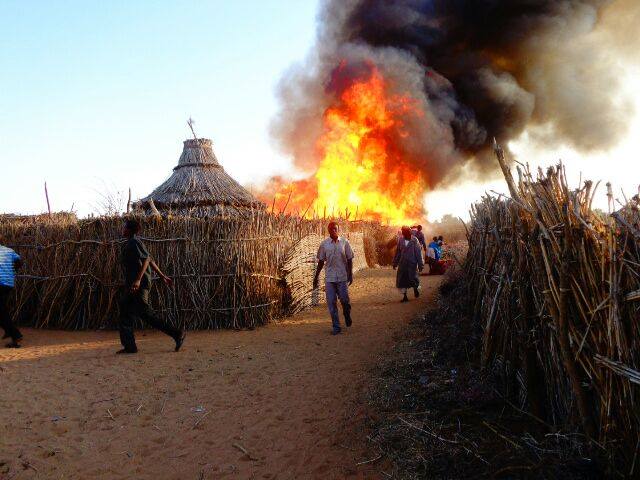
Darfur is a continuing inferno of suffering and destruction
[1] Water shortage, raids cause mass exodus in North Darfur
February 27, 2015 | Um Baru / Karnoi (well north of the Tawilla area)
Thousands of people and their cattle reached Shegeg Karo in Um Baru locality on Wednesday, in search of food and water after fleeing from militiamen which destroyed many of their water sources. The valley in North Darfur now is home to about 17,000 people who have fled with their cattle from Bireidik, Donki Hosh, Donki Jama Al Agadr, Jirgira, Hashaba, Ba’ashim, and Donki Jibril. These villages are located in Karnoi and Um Baru localities. Speaking to Dabanga Sudan, Mohamed Ahmed Minawi Digeish, an independent MP for Um Baru and Karnoi, said he recently visited the area with newly displaced people. “The people escaped from the thirst and lack of food prevailing in the areas, after pro-government militias destroyed their water sources, and occupied the remaining ones.”
Digeish appealed to humanitarian organisations and the Sudanese authorities to speed up the provision of food and water to those affected in Shegeg Karo. The areas with important water sources seem to be targeted most by the air force. The MP explained that it took him a week to visit the displaced and victims in the localities. He found that many areas face a shortage of drinking water. “The livestock are close to dying, unless the authorities proceed to dig water wells, and repair the broken wells and reservoirs.”
He said that the areas most affected are Orschi, Abu Gamra, Abu Leha, Um Hosh, Abar Maza, Moz Bad, and Bredik. These are areas with important water sources for widespread communities, and according to Digeish, targeted the most by the aerial bombardments of the Sudanese Air Force.
Digeish reported that the number of displaced people in Karnoi stands at 19,342, according to omdas and local leaders of the displaced communities [and that] the fact remains that the displaced people still face “extremely difficult humanitarian and health conditions….” “The people, firstly, need security. Secondly, they need tents for shelter. There is also a need for more obstetric material and medicines, for the many pregnant women among the displaced,” says Digeish.
[To be filed under “evidence of continuing genocide in Darfur”: the targets of the attacks are Africa tribal groups; the attacks on water sources are reminiscent of the earliest village assaults by the Janjaweed.]
[2] Sudan security tortures man in Sirba, Central Darfur
February 26, 2015 | Sirba Locality
The security apparatus released Adam Abakar Adam El Dom in Sirba, West Darfur, today, after torturing him for five days. One of his relatives reported to Dabanga that El Dom, a trade middleman at Sirba, disappeared on Sunday. “We were shocked to find him lying at the side of the road, this (Thursday) morning, in a very bad mental and physical condition,” he said. “He told us that he had been held by security agents on Sunday. For consecutive five days, he was severely tortured, beaten and burned.” The Sirba camps coordinator told Dabanga that many civilians have been randomly detained by security forces lately. “El Dom was the most recent case.”
[As numerous Radio Dabanga dispatches makes clear, such detentions, torture, and even executions are a commonplace by Khartoum’s security forces in Darfur.]
An image of Darfur from 2005 (by Brian Steidle, attached to the African Union Mission in Sudan (AMIS). Scenes such as this are again everwhere; the UN Panel of Experts on Darfur estimated on the basis of data available that more than 3,000 villages in Darfur were destroyed in the first five months of 2014 (http://goo.gl/zU3Qlm).
[3] Two children die in explosion, North Darfur
February 26, 2015 | El Fasher Locality
Two children were killed in the area of Khazan Tunjur, North Darfur, on Wednesday, when unexploded ordnance (UXO) detonated. Osman Abdeljabar (9) and Samia Yahya Adam (8) of Sirri village, east of Tabit, found an UXO, while they were grazing their livestock in the neighbourhood. “The device exploded when they played with it,” a relative of Adam told Dabanga. “They died instantly.”
[Such episodes are a grim commonplace in many parts of Darfur.]
[4] Herder set on fire in Darfur’s East Jebel Marra
February 25, 2015 | East Jebel Marra
A herder burned to death in Fanga, East Jebel Marra, on Tuesday. “Elements of the paramilitary Rapid Support Forces (RSF) seized Muntasir Saleh Ahmed, while he was grazing his livestock in the area,” a relative of the victim told Dabanga. “They took him to a public square in Fanga, poured petrol over him, and set him on fire. The people, as well as army officers who heard about this atrocious act, were outraged.” He added that “today, a military helicopter arrived at Fanga, and took three army officers, who are well-known in the area for defending the population against attacks by militiamen, to Nyala.”
[The “new Janjaweed” (the RSF) are just as unconstrained in their cruelty as the “old Janjaweed; the removal of three army officers evidently sympathetic to the local population is ominous.]
[5] Military staff beats pregnant woman in Tabit, North Darfur
February 20, 2015 | Tabit, North Darfur
One of the army personnel in Tabit area, North Darfur, beat a pregnant woman into a coma on Thursday. The beatings caused her serious injuries and haemorrhage, for which she is being treated at an external health clinic. A relative of the victim told Dabanga Sudan that one of the army personnel beat her with rifle butts. The woman is several months pregnant. The relative added that she is one of the victims of the mass rape by Sudanese soldiers in Tabit on 31 October and 1 November last year…. The relative explained that although the family reported the incident to the authorities, the latter did not yet take action against the perpetrator.
[As revealed by the mass rapes at Tabit—committed on orders from Army officers—the Sudan Armed Forces (SAF) can be just as cruel and brutal as the RSF]
Woman (?) killed in militia attack near an IDP camp
[6] Clashes displace over 41,000 people in Darfur: UN
February 20, 2015 | East Jebel Marra / Um Baru
Some 41,000 people have been forced to flee conflict in Darfur so far this year, according to the United Nations Office for Coordination of Humanitarian Affairs (OCHA). It warned that needs for the displaced are significantly higher because relief agencies are largely denied access to East Jebel Marra [a characteristic “UN passive voice construction”: the “denial of access” is on orders from Khartoum’s military], where some of the heaviest fighting between government forces, militiamen, and armed rebels takes place. The access denial has also made exact verification of the numbers of refugees impossible.
Um Baru
As of 12 February, the International Organization for Migration has registered an estimated 7,500 displaced people who have taken refuge near the UN-African Union Mission in Darfur (UNAMID) team site in Um Baru locality, in the western part of North Darfur. The refugees are mainly women and children. The displaced and the locality commissioner have been discussing a possible allocation from the congested safe zone to a more spacious area in Um Baru.
El Fasher rural
Humanitarian organisations have verified an estimated 12,000 displaced people in Behair, Majdob, Shagara A,B,C, and Um Hagaleeg in rural El Fasher. International humanitarian actors have distributed emergency household supplies to people in the Shagara villages. Insecurity in East Jebel Marra worsens further because militia members continue to plunder villages and steal large numbers of livestock. A witness in Um Baru said last week that pro-government militiamen expropriated the areas north of Kutum and in Um Baru and Karnoi localities. “They move in vehicles mounted with automatic weapons, and then divide themselves into two groups. The first group heads directly to the villages to steal the money and properties of the residents. The second group moves to the pasture and steal the livestock in lorries, while they are guarded by gunmen in Land Cruisers,” he described their “tactic.”
A ravaged IDP camp; these camps are increasingly the targets of militia and regular army attacks
[The continuing appropriation of African livestock, possessions, and land makes a meaningful peace agreement all the more difficult; however, Khartoum has shown no interest in such an agreement and remains fully committed to military victory by means of the SAF and RSF.]
[7] West Darfur child killed in savage rape
February 19, 2015 | El Geneina
The broken body of a nine-year-old girl has been found near to the market of El Geneina, capital of West Darfur, apparently after suffering repeated rape. A suspect is in police custody. A relative of Intisar Ahmed Mohamed told Dabanga that her body was found on Tuesday evening in a vehicle in the El Shaati district, north of the city’s market. Intisar’s body was transferred to El Geneina hospital. Following an initial examination, one of the doctors told relatives that she died as a result of injuries caused by repeated rape.
[The culture of impunity concerning rape is so deeply embedded that the most despicable acts of sexual violence are commonplace, even in populated areas. It is distinctly anomalous that a suspect is in police custody; this is almost never the case]
[8] Darfur woman “blown apart” by bomb
February 17, 2015 | Rokoro Locality
A woman was killed along with her donkey when a Sudan Air Force Antonov dropped three bombs on Rokoro locality, Central Darfur on Sunday afternoon. Um Kalthoum Omar Adam and her donkey took a direct hit and were killed instantly. A relative of the dead woman told Dabanga that the explosion tore her body apart so that she could only be identified by her head. In the west of Jebel Marra, several homes were burned and a number of livestock killed when the Sudanese Air Force dropped nine bombs on the Sur Reng area.
Khartoum uses both crude retrofitted Antonov cargo planes as “bombers” and advanced military jet aircraft
[9] Militiamen kill five men, steal cattle in North Darfur
February 13, 2015 | Kutum / Um Baru [See also February 20, 2015 dispatch above]
Five people were shot dead and eight were injured in an attack by militiamen in the area of Sani, north of Kutum in North Darfur, on Thursday. Dozens of cattle were stolen in Um Baru locality when militiamen plundered a village. Pro-government militia members, driving in nine vehicles, entered Sani at 11am. They attacked a number of pastors in Sani and killed Abakr Ibrahim Tumbuk, Abaker Izeldin Mousa Jad, Abdallah Mohamed Imam Jad, Adam Saadalnu Jaalis, Abdallah Ibrahim Nafi. Haroun Abdelshafee Younis, Abdallah Idris Hasabo, Saleh Younis Adam, Shumen Abdallah, and Abdallah Rajab sustained injuries, Omda Abdelnabi Suleiman reported to Dabanga Sudan.
Militiamen also stormed El Anbar valley in Um Baru locality that day. The men attacked and wounded Mohamed Harun Bosh, Ibrahim Abdallah and Mohamed Adam. They left after stealing dozens of cattle, witnesses told Dabanga Sudan. The group moved in 25 vehicles.
“Their new tactic is to divide themselves into two groups: one heads into the village to steal money, the other takes the livestock.” A witness in Um Baru said that pro-government militiamen expropriated the areas north of Kutum and in Um Baru and Karnoi localities, in the west of North Darfur. “They do so by murdering, raping and displacing the people,” the witness said. He revealed that he witnessed the militiamen using a new tactic to plunder towns. “They move in vehicles mounted with with automatic weapons, and then divide themselves into two groups. The first group heads directly to the villages to steal the money and properties of the residents. The second group moves to the pasture and steal the livestock in lorries, while they are guarded by gunmen in Land Cruisers.”
[This does far too much to define the lives of people from African tribal groups in North Darfur; this is only one of many such reports, and makes clear that genocide continues.]
Militia forces, predominantly the Rapid Response Forces, have been given free rein to rape, murder, burn, and pillage
[10] Attacks on villages, police station in North Darfur leave three dead
February 12, 2015 | Tawilla / Kutum / Mellit [These three North Darfur towns give some geographical sense of how widespread the current violence is; the brazen attack on the Mellit police station is a sign of how completely unconstrained the militia forces have become.]
At least two militiamen were killed and others injured on Monday, in a raid on two villages in Tawilla Locality, North Darfur. On Tuesday, a village in Kutum Locality was pillaged, and a policeman was shot dead in an attack on the police station of Mellit. One of the sheikhs of Kalo told Dabanga that “a group of Janjaweed riding on camels” stormed the villages of Kalo and Doudi, south of Tabra in Tawila locality, with the purpose to plunder them. “The people confronted the attackers, killed at least two of them, and wounded others.” He said that the villagers were “on guard” since January. “The same attackers are responsible for the killing of people, the torching of their villages, and robbing them of thousands of livestock in the past month.”
Bakouri village
On Tuesday, a large group of militia troops pillaged the entire village of Bakouri in Kutum locality, North Darfur, on Tuesday. “Militiamen in six Land Cruisers attacked Bakouri, east of Dor, on Tuesday around noon,” one of the victims informed Dabanga. “They raided the shops and houses one by one, and robbed us of all our money, personal belongings, agricultural crops, and fuel. They also stole 18 camels.”
Mellit police station
In Mellit town, policeman Abu Zur El Doma was killed, and policemen El Fadel Mohamed El Hassan, Abdelrahman Abdallah Adam, and Zaki Mohamed Ibrahim were seriously injured in a militia attack on Tuesday morning. The Commissioner of Mellit locality, Kamaleldin Yahya Khalil, confirmed the attack “by unidentified gunmen” on the police station, saying that they also stole two police vehicles.
Darfuris have attempted to keep track of the ghastly mortality total during the genocide; they have little help. See http://wp.me/p45rOG-AB
*******************************
“The victims [of the Holocaust] perished not only because of the killers, but also because of the apathy of the bystanders. What astonished us after the torment, after the tempest, was not that so many killers killed so many victims, but that so few cared about us at all.”
[Elie Wiesel, “Why were there so few?”]
